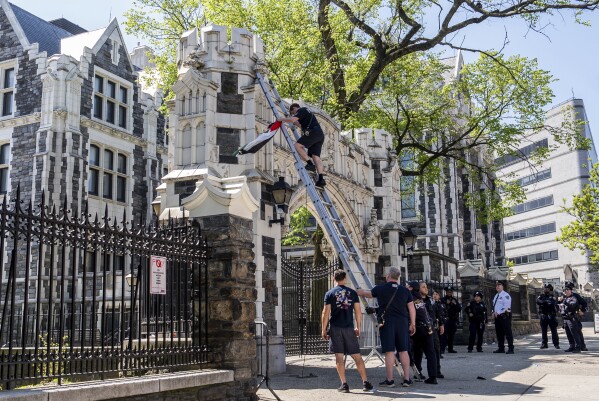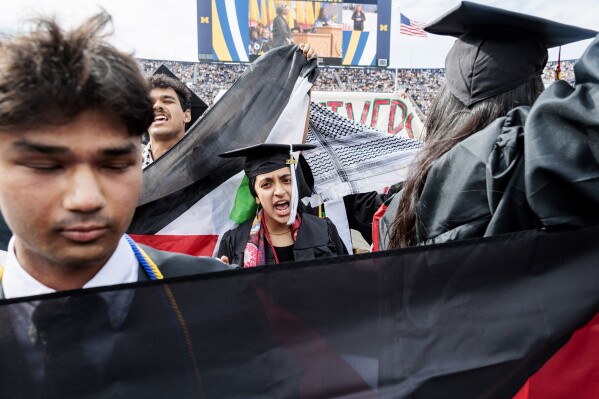Pro-Palestinian demonstrators gather to protest University of Michigan President Santa Ono’s “Statement regarding Mideast violence” outside the University of Michigan President’s House, Oct. 13, 2023, in Ann Arbor, Mich. The University of Michigan failed to assess whether protests and other incidents on campus in response to the Israel-Hamas war created a hostile environment for students, staff and faculty. That’s according to the results of an U.S. Education Department investigation announced Monday.
(Jacob Hamilton/Ann Arbor News via AP, File)Read More

- A firefighter retrieves a Palestinian flag from a gate to the City University of New York, May 1, 2024, in New York. The University of Michigan and the City University of New York didn’t adequately investigate if campus protests in response to the Israel-Hamas war and other incidents created a hostile environment for students, faculty and staff. That’s according to results of U.S. Education Department investigations announced Monday.
- A firefighter retrieves a Palestinian flag from a gate to the City University of New York, May 1, 2024, in New York. The University of Michigan and the City University of New York didn’t adequately investigate if campus protests in response to the Israel-Hamas war and other incidents created a hostile environment for students, faculty and staff. That’s according to results of U.S. Education Department investigations announced Monday.
(AP Photo/Julia Nikhinson, File)

Pro-Palestinian protesters demonstrate during the University of Michigan’s Spring 2024 Commencement Ceremony at Michigan Stadium in Ann Arbor, Mich., May 4, 2024. The University of Michigan and the City University of New York didn’t adequately investigate if campus protests in response to the Israel-Hamas war and other incidents created a hostile environment for students, faculty and staff. That’s according to results of U.S. Education Department investigations announced Monday.
Pro-Palestinian protesters demonstrate during the University of Michigan’s Spring 2024 Commencement Ceremony at Michigan Stadium in Ann Arbor, Mich., May 4, 2024. The University of Michigan and the City University of New York didn’t adequately investigate if campus protests in response to the Israel-Hamas war and other incidents created a hostile environment for students, faculty and staff. That’s according to results of U.S. Education Department investigations announced Monday.
(Jacob Hamilton/Ann Arbor News via AP, file)

Pro-Palestinian protesters demonstrate during the University of Michigan’s Spring 2024 Commencement Ceremony at Michigan Stadium in Ann Arbor, Mich., May 4, 2024. The University of Michigan and the City University of New York didn’t adequately investigate if campus protests in response to the Israel-Hamas war and other incidents created a hostile environment for students, faculty and staff. That’s according to results of U.S. Education Department investigations announced Monday.
Pro-Palestinian protesters demonstrate during the University of Michigan’s Spring 2024 Commencement Ceremony at Michigan Stadium in Ann Arbor, Mich., May 4, 2024. The University of Michigan and the City University of New York didn’t adequately investigate if campus protests in response to the Israel-Hamas war and other incidents created a hostile environment for students, faculty and staff. That’s according to results of U.S. Education Department investigations announced Monday.
( Jacob Hamilton/Ann Arbor News via AP, File)

Pro-Palestinian protesters demonstrate during the University of Michigan’s Spring 2024 Commencement Ceremony at Michigan Stadium in Ann Arbor, Mich., May 4, 2024. The University of Michigan and the City University of New York didn’t adequately investigate if campus protests in response to the Israel-Hamas war and other incidents created a hostile environment for students, faculty and staff. That’s according to results of U.S. Education Department investigations announced Monday.
Pro-Palestinian protesters demonstrate during the University of Michigan’s Spring 2024 Commencement Ceremony at Michigan Stadium in Ann Arbor, Mich., May 4, 2024. The University of Michigan and the City University of New York didn’t adequately investigate if campus protests in response to the Israel-Hamas war and other incidents created a hostile environment for students, faculty and staff. That’s according to results of U.S. Education Department investigations announced Monday.
(Katy Kildee/Detroit News via AP, File)
BY COLLIN BINKLEY AND ANNIE MA
June 17, 2024
WASHINGTON (AP) — The University of Michigan and the City University of New York did not adequately investigate complaints about antisemitic or anti-Palestinian harassment linked to campus protests over the Israel-Hamas war and other incidents, according to the results of investigations by the U.S. Education Department announced Monday.
These are the first investigations to reach a conclusion among dozens launched by the Education Department since Oct. 7, the day Hamas launched a surprise attack on Israel.
The department’s Office of Civil Rights investigated 75 instances of alleged discrimination and harassment at the University of Michigan based on shared Jewish ancestry and shared Palestinian or Muslim ancestry. The investigation found that the university’s responses did not meet its Title VI requirements to remedy the hostile environment.
In one instance, when a Jewish student reported being called out for viewing a graduate student instructor’s social media post about pro-Palestinian topics, the university told the student that “formal conflict resolution is not a path forward at this time,” because the incident occurred on social media.
In another instance, when a student who participated in a pro-Palestinian protest was called a “terrorist,” the university said it held “restorative circles” to address the incident but did not take further action.
In its resolution agreement, the University of Michigan agreed to administer a climate assessment, implement additional training and revise its policies as necessary. It also agreed to monitoring by the Office of Civil Rights through the end of the 2026 school year, reporting its responses to future incidents of discrimination to the department.
“The university condemns all forms of discrimination, racism and bias in the strongest possible terms,” University of Michigan President Santa J. Ono said in a statement. “We continually work to educate our community around the rights and privileges of free speech to ensure that debate does not tip over into targeted harassment or bullying. This agreement reflects the university’s commitment to ensuring it has the tools needed to determine whether an individual’s acts or speech creates a hostile environment, and taking the affirmative measures necessary to provide a safe and supportive educational environment for all.”
The department also announced the resolution of nine pending complaints against schools in the City University of New York system, dating back to the 2019-20 academic year.
Those incidents include harassment and disparate treatment of students based on shared Jewish, Palestinian, Arab, Muslim or South Asian ancestry.
The university system agreed to reopen or initiate investigations into discrimination complaints and provide the Office of Civil Rights with the results and report any remedial action the university would take. The resolution also included increased training for both employees and security officers on campus, as well as a climate survey and third-party review of non-discrimination policies.
“Colleges serve as beacons of free speech and expression, but the safety of our students, staff and faculty is paramount,” CUNY Chancellor Félix V. Matos Rodríguez said in a statement. “CUNY is committed to providing an environment that is free from discrimination and hate and these new steps will ensure that there is consistency and transparency in how complaints are investigated and resolved.”
Complaints of antisemitism and Islamophobia have led to inquiries at more than 100 universities and school districts, including Harvard and Yale, community colleges and public schools from Los Angeles to suburban Minneapolis.
The complaints vary widely but all accuse schools of violating Title VI of the Civil Rights Act of 1964, which prohibits discrimination based on race, color or national origin. Colleges and schools are required to protect students from discrimination, and when they don’t, the Education Department can invoke penalties up to termination of federal money.
Protests over the Israel-Hamas war upended the final weeks of the school year at many campuses across the country, with some cancelling graduation ceremonies or moving classes online after Pro-Palestinian protesters set up encampments in campus spaces.
The protests have tested schools as they aim to balance free speech rights and the safety of students. The Education Department has issued guidance detailing schools’ responsibilities around Title VI, but the results of the agency’s investigations could provide a clearer line showing where political speech crosses into harassment.
Finding that boundary has been a struggle for colleges as they grapple with rhetoric that has different meaning to different people. Some chants commonly used by pro-Palestinian activists are seen by some as antisemitic, including “from the river to the sea, Palestine will be free” and “intifada revolution.”
Meanwhile, some complaints say Arab and Muslim students have faced abuses only to be ignored by campus officials. At Harvard, the Education Department is investigating separate complaints, one over alleged antisemitism and the other over alleged Islamophobia.
“Hate has no place on our college campuses — ever,” Education Secretary Miguel Cardona said in a statement. “Sadly, we have witnessed a series of deeply concerning incidents in recent months. There’s no question that this is a challenging moment for school communities across the country.”
More investigations are expected to be resolved in the coming weeks, but Cardona said his agency is struggling to keep up with the influx of cases.
Republicans have rejected requests to increase money for the Office for Civil Rights in recent years, while the average case load increased to 42 per investigator in 2023. Without more money, that figure could increase to more than 70 cases per investigator, Cardona has said.
“We are desperately in need of additional support to make sure we can investigate the cases that we have in front of us,” Cardona told members of the House in May.
On average, cases take about six to eight months to resolve. The vast majority of the agency’s civil rights investigations end with voluntary resolutions. Schools usually promise to resolve any lingering problems and take steps to protect students in the future.
While the Education Department investigates, several colleges and school districts have separately been called before Congress to answer allegations of antisemitism. Republicans have held a series of hearings on the issue, grilling leaders accused of tolerating antisemitism.
The hearings contributed to the resignations of some college leaders, including Liz Magill at the University of Pennsylvania and Harvard’s Claudine Gay, who was also embroiled in accusations of plagiarism.
___
The Associated Press’ education coverage receives financial support from multiple private foundations. THe AP is solely responsible for all content. Find the AP’s standards for working with philanthropies, a list of supporters and funded coverage areas at AP.org.

COLLIN BINKLEY
Collin is a national education reporter
twitter mailto

ANNIE MA
Ma is an Associated Press national writer who covers K-12 education.
twitter mailto
BY COLLIN BINKLEY AND ANNIE MA
June 17, 2024
WASHINGTON (AP) — The University of Michigan and the City University of New York did not adequately investigate complaints about antisemitic or anti-Palestinian harassment linked to campus protests over the Israel-Hamas war and other incidents, according to the results of investigations by the U.S. Education Department announced Monday.
These are the first investigations to reach a conclusion among dozens launched by the Education Department since Oct. 7, the day Hamas launched a surprise attack on Israel.
The department’s Office of Civil Rights investigated 75 instances of alleged discrimination and harassment at the University of Michigan based on shared Jewish ancestry and shared Palestinian or Muslim ancestry. The investigation found that the university’s responses did not meet its Title VI requirements to remedy the hostile environment.
In one instance, when a Jewish student reported being called out for viewing a graduate student instructor’s social media post about pro-Palestinian topics, the university told the student that “formal conflict resolution is not a path forward at this time,” because the incident occurred on social media.
In another instance, when a student who participated in a pro-Palestinian protest was called a “terrorist,” the university said it held “restorative circles” to address the incident but did not take further action.
In its resolution agreement, the University of Michigan agreed to administer a climate assessment, implement additional training and revise its policies as necessary. It also agreed to monitoring by the Office of Civil Rights through the end of the 2026 school year, reporting its responses to future incidents of discrimination to the department.
“The university condemns all forms of discrimination, racism and bias in the strongest possible terms,” University of Michigan President Santa J. Ono said in a statement. “We continually work to educate our community around the rights and privileges of free speech to ensure that debate does not tip over into targeted harassment or bullying. This agreement reflects the university’s commitment to ensuring it has the tools needed to determine whether an individual’s acts or speech creates a hostile environment, and taking the affirmative measures necessary to provide a safe and supportive educational environment for all.”
The department also announced the resolution of nine pending complaints against schools in the City University of New York system, dating back to the 2019-20 academic year.
Those incidents include harassment and disparate treatment of students based on shared Jewish, Palestinian, Arab, Muslim or South Asian ancestry.
The university system agreed to reopen or initiate investigations into discrimination complaints and provide the Office of Civil Rights with the results and report any remedial action the university would take. The resolution also included increased training for both employees and security officers on campus, as well as a climate survey and third-party review of non-discrimination policies.
“Colleges serve as beacons of free speech and expression, but the safety of our students, staff and faculty is paramount,” CUNY Chancellor Félix V. Matos Rodríguez said in a statement. “CUNY is committed to providing an environment that is free from discrimination and hate and these new steps will ensure that there is consistency and transparency in how complaints are investigated and resolved.”
Complaints of antisemitism and Islamophobia have led to inquiries at more than 100 universities and school districts, including Harvard and Yale, community colleges and public schools from Los Angeles to suburban Minneapolis.
The complaints vary widely but all accuse schools of violating Title VI of the Civil Rights Act of 1964, which prohibits discrimination based on race, color or national origin. Colleges and schools are required to protect students from discrimination, and when they don’t, the Education Department can invoke penalties up to termination of federal money.
Protests over the Israel-Hamas war upended the final weeks of the school year at many campuses across the country, with some cancelling graduation ceremonies or moving classes online after Pro-Palestinian protesters set up encampments in campus spaces.
The protests have tested schools as they aim to balance free speech rights and the safety of students. The Education Department has issued guidance detailing schools’ responsibilities around Title VI, but the results of the agency’s investigations could provide a clearer line showing where political speech crosses into harassment.
Finding that boundary has been a struggle for colleges as they grapple with rhetoric that has different meaning to different people. Some chants commonly used by pro-Palestinian activists are seen by some as antisemitic, including “from the river to the sea, Palestine will be free” and “intifada revolution.”
Meanwhile, some complaints say Arab and Muslim students have faced abuses only to be ignored by campus officials. At Harvard, the Education Department is investigating separate complaints, one over alleged antisemitism and the other over alleged Islamophobia.
“Hate has no place on our college campuses — ever,” Education Secretary Miguel Cardona said in a statement. “Sadly, we have witnessed a series of deeply concerning incidents in recent months. There’s no question that this is a challenging moment for school communities across the country.”
More investigations are expected to be resolved in the coming weeks, but Cardona said his agency is struggling to keep up with the influx of cases.
Republicans have rejected requests to increase money for the Office for Civil Rights in recent years, while the average case load increased to 42 per investigator in 2023. Without more money, that figure could increase to more than 70 cases per investigator, Cardona has said.
“We are desperately in need of additional support to make sure we can investigate the cases that we have in front of us,” Cardona told members of the House in May.
On average, cases take about six to eight months to resolve. The vast majority of the agency’s civil rights investigations end with voluntary resolutions. Schools usually promise to resolve any lingering problems and take steps to protect students in the future.
While the Education Department investigates, several colleges and school districts have separately been called before Congress to answer allegations of antisemitism. Republicans have held a series of hearings on the issue, grilling leaders accused of tolerating antisemitism.
The hearings contributed to the resignations of some college leaders, including Liz Magill at the University of Pennsylvania and Harvard’s Claudine Gay, who was also embroiled in accusations of plagiarism.
___
The Associated Press’ education coverage receives financial support from multiple private foundations. THe AP is solely responsible for all content. Find the AP’s standards for working with philanthropies, a list of supporters and funded coverage areas at AP.org.

COLLIN BINKLEY
Collin is a national education reporter
twitter mailto

ANNIE MA
Ma is an Associated Press national writer who covers K-12 education.
twitter mailto











